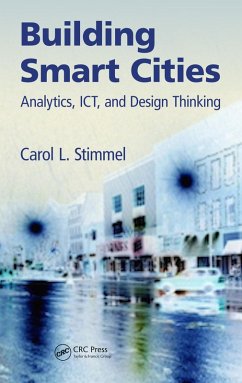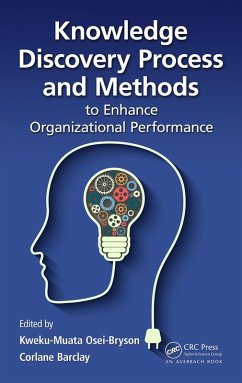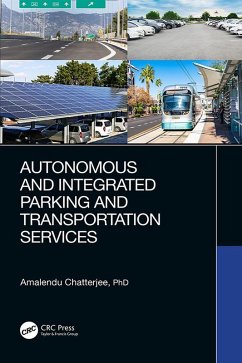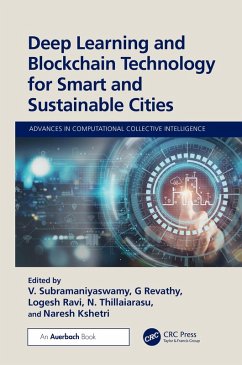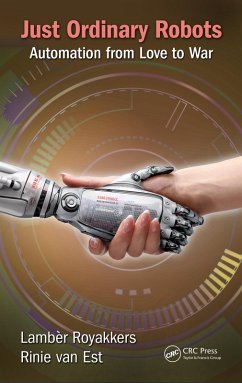
PAYBACK Punkte
21 °P sammeln!






The term "smart city" defines the new urban environment, one that is designed for performance through information and communication technologies. Given that the majority of people across the world will live in urban environments within the next few decades, it's not surprising that massive effort and investment is being placed into efforts to devel
Dieser Download kann aus rechtlichen Gründen nur mit Rechnungsadresse in A, B, BG, CY, CZ, D, DK, EW, E, FIN, F, GR, HR, H, IRL, I, LT, L, LR, M, NL, PL, P, R, S, SLO, SK ausgeliefert werden.
- Geräte: PC
- mit Kopierschutz
- eBook Hilfe
- Größe: 16.69MB
- Text-to-Speech
- E-Mail des Verlags für Barrierefreiheitsfragen: ebookqueries@tandf.co.uk
- Seitennummerierung folgt dem gedruckten Werk
- Kurze Alternativtexte für nicht-textuelle Inhalte vorhanden
- Navigierbarer Index mit direktem Zugriff auf Indexbegriffe
- Navigierbares Inhaltsverzeichnis für direkten Zugriff auf Text und Medien
- Keine Einschränkung der Vorlesefunktionen, außer bei spezifischen Ausnahmen
Carol L. Stimmel is the founder and CEO of Manifest Mind, a collaborative research and consulting organization, working to ensure that companies and investors have the information they need to make enduring investment decisions in the complex world of sustainability. Stimmel is recognized for her integrity, years of experience, independent spirit, and ability to create expert teams on-demand, which have rapidly made Manifest Mind a trusted source of insight for assessing opportunities in developing human economies, the built environment, and natural ecosystems.
With 25 years of experience in emerging technology markets, including operations, research and analysis, and product design, she is a frequent speaker and co-author of The Manager Pool (2001), author of Big Data Analytics Strategies for the Smart Grid (2014), and Building Smart Cities: Analytics, ICT, and Design Thinking (2015). Currently, she is working on new approaches in the field of sustainable finance and future tech collaboration. Stimmel holds several key technology patents and pending applications with myriad co-inventors, including those related to virtual communication, broadcasting, autonomic computing, and energy benchmarking.
With 25 years of experience in emerging technology markets, including operations, research and analysis, and product design, she is a frequent speaker and co-author of The Manager Pool (2001), author of Big Data Analytics Strategies for the Smart Grid (2014), and Building Smart Cities: Analytics, ICT, and Design Thinking (2015). Currently, she is working on new approaches in the field of sustainable finance and future tech collaboration. Stimmel holds several key technology patents and pending applications with myriad co-inventors, including those related to virtual communication, broadcasting, autonomic computing, and energy benchmarking.
Produktdetails
- Verlag: Taylor & Francis eBooks
- Seitenzahl: 290
- Erscheinungstermin: 18. August 2015
- Englisch
- ISBN-13: 9781498702775
- Artikelnr.: 43975518
"Carol Stimmel has set out to carry forward many of the lessons in early smart cities efforts. She lays out her thinking in a rigorous and methodical manner that serves to teach the reader design-thinking principles for solving challenging complex smarter cities problems. She also provides an innovative framework within which to consider appropriate solutions. But, perhaps the most compelling thing about this book is the demonstration of the fact that the vision for human-centric smart cities is entirely achievable and wholesomely probable - this is not some idyllic future, this is a reality that we are quickly coming to face and for which we have tools to address."
- From the Book's Foreword by Sherry Comes, IBM Distinguished Engineer
- From the Book's Foreword by Sherry Comes, IBM Distinguished Engineer
Mehr anzeigen
& CTO/Entrepreneur
"Ms. Stimmel lays out the problems associated with the current trajectory of the development of smart cities concisely and provides a cogent argument for how applying design thinking to this domain will improve the likelihood of enabling people in urban environments 'to be productive, socially connected, and economically successful.' She argues that we must put design and human experience before technical capabilities, and that we must view the enterprise of building smart cities holistically and within specific cultural contexts. Engineers, user experience professionals, and students who are new to either the topic of smart cities, to the practices of design thinking, or experience design will benefit greatly from reading this book."
- Anne P. McClard, PhD, UX Research and Design Lead, Intel Corporation
"Carol Stimmel has penned a book not just to be read by city planners, engineers, or technology experts. This narrative is for all of us - the artist, a student, the farmer, a banker. 'Using design thinking, a human-centered approach to innovation, urban designers can create new products and processes that are well grounded in empathy.' These are weighted words of truth as we move forward, seeking balance in an often unbalanced world, Ms. Stimmel's voice resonates in deeply human prose and debate, relevant to our humanity today, the past and most succinctly, our collective future."
-John Stanmeyer, American photojournalist, National Geographic
"The Internet of Things is the Wild West of new technology trends. While it is currently peaking on the technology hype curve, its impact on the future technology landscape is irrefutable. With every tech startup company (and even massive incumbents) trying to redefine the IoT in their own image, Ms. Stimmel brings us back to earth with the tried and true design approach that defines the problems in human terms before presuming the solutions.
With the rise of each new culture twisting technology most early pioneers imagine the bright future through lenses shaped in the past. Ms. Stimmel's approach helps avoid such mistakes by taking a fresh look at how people are affected and how lives can be improved when technologists are armed with new tools. This book should be required reading for politicians, sociologists, urban geographers, and technologists who intend to build the cities of the future."
- Clarke Stevens, Principle IoT Architect, CableLabs
"Finally, someone breaks the myth about the perfect value of ubiquitous Big Data. Ms. Stimmel purports that Big Data with little wisdom is a dangerous combination and that, if we do not disrupt it with the collective voice and spirt of human city dwellers, we will continue to run the perilous risk of inequality, injustice, and a compromised quality of life, affecting mostly those who are socially and economically disenfranchised. With lucidity, grace, and compassion, and an arsenal of Big Data behind her, Carol Stimmel firmly and unequivocally argues that human beings need to be an integral part of the design and development of their cities, and that cities should belong to the people and be governed by the people, not by machines and algorithms."
- Jude Smith Rachele, PhD, Co-Founder and CEO of Abundant Sun
"This is a critically important book. Carol Stimmel takes the viewpoint that our technology and device centric approach to building smart cities of the future will need to give way to a human-centric approach if we are going to build metropolises in which the 50% of the world's population that lives in urban areas can thrive. She accomplishes this by asking the right questions, especially how can we build cities that work for people? She provides practical approaches to developing these solutions."
- Nicole Poindexter, Founder and CEO, Energicity
"Ms. Stimmel lays out the problems associated with the current trajectory of the development of smart cities concisely and provides a cogent argument for how applying design thinking to this domain will improve the likelihood of enabling people in urban environments 'to be productive, socially connected, and economically successful.' She argues that we must put design and human experience before technical capabilities, and that we must view the enterprise of building smart cities holistically and within specific cultural contexts. Engineers, user experience professionals, and students who are new to either the topic of smart cities, to the practices of design thinking, or experience design will benefit greatly from reading this book."
- Anne P. McClard, PhD, UX Research and Design Lead, Intel Corporation
"Carol Stimmel has penned a book not just to be read by city planners, engineers, or technology experts. This narrative is for all of us - the artist, a student, the farmer, a banker. 'Using design thinking, a human-centered approach to innovation, urban designers can create new products and processes that are well grounded in empathy.' These are weighted words of truth as we move forward, seeking balance in an often unbalanced world, Ms. Stimmel's voice resonates in deeply human prose and debate, relevant to our humanity today, the past and most succinctly, our collective future."
-John Stanmeyer, American photojournalist, National Geographic
"The Internet of Things is the Wild West of new technology trends. While it is currently peaking on the technology hype curve, its impact on the future technology landscape is irrefutable. With every tech startup company (and even massive incumbents) trying to redefine the IoT in their own image, Ms. Stimmel brings us back to earth with the tried and true design approach that defines the problems in human terms before presuming the solutions.
With the rise of each new culture twisting technology most early pioneers imagine the bright future through lenses shaped in the past. Ms. Stimmel's approach helps avoid such mistakes by taking a fresh look at how people are affected and how lives can be improved when technologists are armed with new tools. This book should be required reading for politicians, sociologists, urban geographers, and technologists who intend to build the cities of the future."
- Clarke Stevens, Principle IoT Architect, CableLabs
"Finally, someone breaks the myth about the perfect value of ubiquitous Big Data. Ms. Stimmel purports that Big Data with little wisdom is a dangerous combination and that, if we do not disrupt it with the collective voice and spirt of human city dwellers, we will continue to run the perilous risk of inequality, injustice, and a compromised quality of life, affecting mostly those who are socially and economically disenfranchised. With lucidity, grace, and compassion, and an arsenal of Big Data behind her, Carol Stimmel firmly and unequivocally argues that human beings need to be an integral part of the design and development of their cities, and that cities should belong to the people and be governed by the people, not by machines and algorithms."
- Jude Smith Rachele, PhD, Co-Founder and CEO of Abundant Sun
"This is a critically important book. Carol Stimmel takes the viewpoint that our technology and device centric approach to building smart cities of the future will need to give way to a human-centric approach if we are going to build metropolises in which the 50% of the world's population that lives in urban areas can thrive. She accomplishes this by asking the right questions, especially how can we build cities that work for people? She provides practical approaches to developing these solutions."
- Nicole Poindexter, Founder and CEO, Energicity
Schließen
Für dieses Produkt wurde noch keine Bewertung abgegeben. Wir würden uns sehr freuen, wenn du die erste Bewertung schreibst!
Eine Bewertung schreiben
Eine Bewertung schreiben
Andere Kunden interessierten sich für




